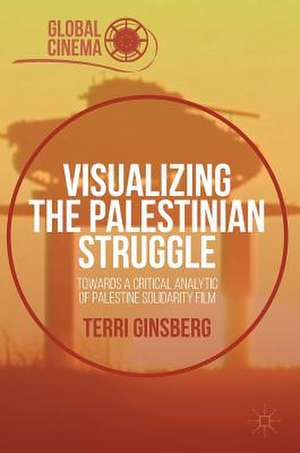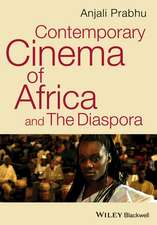Visualizing the Palestinian Struggle: Towards a Critical Analytic of Palestine Solidarity Film: Global Cinema
Autor Terri Ginsbergen Limba Engleză Hardback – 4 noi 2016
| Toate formatele și edițiile | Preț | Express |
|---|---|---|
| Paperback (1) | 576.58 lei 6-8 săpt. | |
| Springer International Publishing – 27 iun 2018 | 576.58 lei 6-8 săpt. | |
| Hardback (1) | 580.82 lei 6-8 săpt. | |
| Springer International Publishing – 4 noi 2016 | 580.82 lei 6-8 săpt. |
Din seria Global Cinema
- 9%
 Preț: 767.63 lei
Preț: 767.63 lei - 20%
 Preț: 566.90 lei
Preț: 566.90 lei -
 Preț: 386.81 lei
Preț: 386.81 lei - 15%
 Preț: 643.34 lei
Preț: 643.34 lei - 18%
 Preț: 783.68 lei
Preț: 783.68 lei - 15%
 Preț: 699.12 lei
Preț: 699.12 lei -
 Preț: 392.37 lei
Preț: 392.37 lei -
 Preț: 385.84 lei
Preț: 385.84 lei - 15%
 Preț: 644.18 lei
Preț: 644.18 lei - 15%
 Preț: 592.44 lei
Preț: 592.44 lei - 15%
 Preț: 709.77 lei
Preț: 709.77 lei - 15%
 Preț: 706.30 lei
Preț: 706.30 lei - 18%
 Preț: 790.46 lei
Preț: 790.46 lei - 18%
 Preț: 782.72 lei
Preț: 782.72 lei - 18%
 Preț: 732.21 lei
Preț: 732.21 lei -
 Preț: 386.81 lei
Preț: 386.81 lei - 15%
 Preț: 582.80 lei
Preț: 582.80 lei - 18%
 Preț: 781.15 lei
Preț: 781.15 lei - 15%
 Preț: 640.06 lei
Preț: 640.06 lei - 15%
 Preț: 698.15 lei
Preț: 698.15 lei - 18%
 Preț: 735.07 lei
Preț: 735.07 lei
Preț: 580.82 lei
Preț vechi: 683.32 lei
-15% Nou
Puncte Express: 871
Preț estimativ în valută:
111.14€ • 118.85$ • 92.67£
111.14€ • 118.85$ • 92.67£
Carte tipărită la comandă
Livrare economică 17 aprilie-01 mai
Preluare comenzi: 021 569.72.76
Specificații
ISBN-13: 9783319397764
ISBN-10: 3319397761
Pagini: 175
Ilustrații: XI, 157 p. 8 illus.
Dimensiuni: 148 x 210 x 15 mm
Greutate: 0.33 kg
Ediția:1st ed. 2016
Editura: Springer International Publishing
Colecția Palgrave Macmillan
Seria Global Cinema
Locul publicării:Cham, Switzerland
ISBN-10: 3319397761
Pagini: 175
Ilustrații: XI, 157 p. 8 illus.
Dimensiuni: 148 x 210 x 15 mm
Greutate: 0.33 kg
Ediția:1st ed. 2016
Editura: Springer International Publishing
Colecția Palgrave Macmillan
Seria Global Cinema
Locul publicării:Cham, Switzerland
Cuprins
Introduction – Modalities of Solidarity.- Chapter One – After Al-Aqsa.- Chapter Two – Revisiting Prior Commitments.- Chapter Three – Distant Neighbors.- Conclusion – A Time for Change.
Recenzii
“Visualizing Palestine is a groundbreaking resource on films of Palestine solidarity. The book presents a valuable teaching tool at the undergraduate and graduate levels. It would make essential reading for the study of Palestine cinema for its simultaneous analysis of marginal films and their critique of the hegemonic systems that silence them. To use any part of this book would be an affirmative act of solidarity.” (Samirah Alkassim, Arab Studies Quarterly, Vol. 43 (2), 2021)
Notă biografică
Terri Ginsberg is Assistant Professor of Film at The American University in Cairo. She is co-author of Historical Dictionary of Middle Eastern Cinema; author of Holocaust Film: The Political Aesthetics of Ideology; and co-editor of Perspectives on German Cinema and A Companion to German Cinema.
Textul de pe ultima copertă
This book offers a much-needed focus on Palestine solidarity films, supplying a critical theoretical framework whose intellectual thrust is rooted in the challenges facing scholars censored for attempting to rectify and reverse the silencing of a subject matter about which much of the world would remain uninformed without cinematic and televisual mediation. Its innovative focus on Palestine solidarity films spans a selected array of works which began to emerge during the 1970s, made by directors located outside Palestine/Israel who professed support for Palestinian liberation. Visualizing the Palestinian Struggle analyzes Palestinian solidarity films hailing from countries such as Canada, the United Kingdom, Egypt, Iran, Palestine/Israel, Mexico, and the United States. Visualizing the Palestinian Struggle is an effort to insist, constructively, upon a rectification and reversal of the glaring and disproportionate minimization and distortion of discourse critical of Zionism and Israeli policy in the cinematic and televisual public sphere.
Caracteristici
Creates a theory of solidarity film applicable to and beyond the Palestinian case Offers new points of analysis on the Palestinian–Israeli conflict and its political spectrum from film studies, cultural studies, and political studies lenses alike Includes allegorical “interludes” focusing on films made by Palestinians themselves in Palestine








